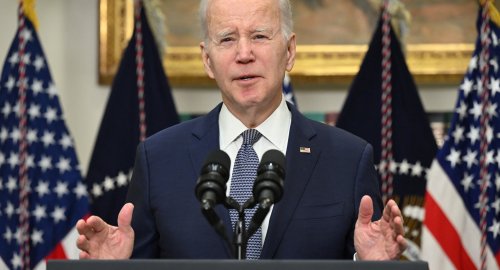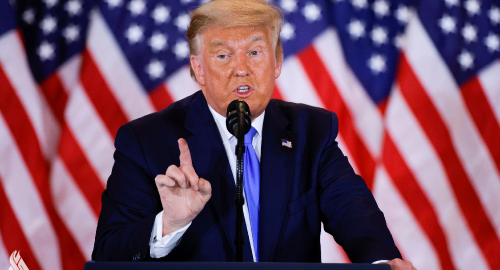
Biden and McCarthy Reach No Consensus as a Possible Default Looms

- 10-05-2023, 08:58
INA- sources
President Biden and Speaker Kevin McCarthy emerged from a critical meeting at the White House on Tuesday with no consensus on how to end their impasse over the federal debt and spending just weeks before the nation is set to default on its obligations for the first time.
With the economy hanging in the balance, the two leaders stuck to their opening positions, with Mr. Biden demanding that Congress raise the debt ceiling unconditionally to avoid a default and Mr. McCarthy insisting such a move be accompanied by serious spending restraints. But the two agreed to have aides meet later in the day and to reconvene themselves on Friday.
The session in the Oval Office, the first such meeting in three months between the Democratic president and Republican speaker, was the opening act in a drama expected to play out over the next few weeks as the nation hurtles toward a deadline around June 1 before running out of authority to pay its debts. Neither side expected the meeting to produce a breakthrough, and it did not. Instead, it was a chance for both camps to lay down markers for the make-or-break debate.
“I made clear during our meeting that default is not an option,” Mr. Biden said after the session in the Oval Office. “I repeated that time and again. America is not a deadbeat nation. We pay our bills and avoiding default is a basic duty of the United States Congress.”
But he added: “I’m prepared to begin a separate discussion about my budget and spending priorities but not under the threat of default.”
Meeting with reporters as he left the White House, Mr. McCarthy said the two sides remained at loggerheads. “I didn’t see any new movement,” he said. He added that he had asked Mr. Biden “numerous times” if there were places in the federal budget where they could find cuts. “They wouldn’t give me any,” he said.
In one potential sign of progress, the two sides agreed to have their staffs meet as early as Tuesday night and daily through the rest of the week to discuss possible agreements on spending levels for next year’s bills to fund government operations — which could lead toward the sort of broader fiscal agreement that Mr. Biden has said he would discuss.
The federal government has already reached its $31.4 trillion debt ceiling set by law and the Treasury Department has said it could run out of financial methods to avoid breaching it by the end of the month. If it came to that without an agreement by Congress, the nation would fail to meet its obligations to pay for previously approved spending, which analysts have said could send an economic shock wave through the economy at home and across the world, potentially triggering a recession and putting as many as millions out of work.
Both the White House and Mr. McCarthy dismissed the idea of a short-term debt ceiling increase to allow more time for discussions, but time is running short. The speaker told reporters in the Capitol that he believed congressional leaders and Mr. Biden would need to strike a deal by next week in order to pass legislation raising the debt ceiling by early June.
Democrats sought to use that comment to isolate Mr. McCarthy, suggesting that he was the only one willing to risk default. But the speaker said he was the only one who has actually passed an increase in the debt ceiling, referring to legislation that tied such a hike to spending caps and other measures.
He stressed that the president had refused to meet him for 97 days, contending that Mr. Biden was acting irresponsibly by not agreeing to compromise. “I’m hoping that the next two weeks are different,” Mr. McCarthy said. “I’m hoping this president understands as the leader of this nation that you can’t sit back and hold the country hostage. You can’t be so extreme in your views that you’re not going to negotiate. And to the American public, we’ve been very reasonable.”
Mr. Biden blamed Mr. McCarthy for not passing a bill to raise the limit until late April. The president left open the possibility that he might seek to bypass Congress and pay debts on his own by asserting authority under a provision of the 14th Amendment that says “the validity of the public debt of the United States” authorized by law “shall not be questioned.” He noted that Laurence H. Tribe, the longtime Harvard Law School professor, had changed his mind about whether a president has such power.
But he indicated that solution might not work in the short term. “The problem is it would have to be litigated and in the meantime, without an extension, it would end up in the same place,” he said. He added that he was thinking of testing the prospect some months after resolving the current crisis, to avoid future clashes over the debt ceiling.
Further complicating the schedule: The president is scheduled to fly to Japan next week to attend the leaders’ summit for the Group of 7 industrialized nations, before traveling on to a security summit in Australia. Speaking with reporters after the meeting, Mr. Biden said it was “possible, not likely” that he would have to curtail or skip the trip because the debate over the debt ceiling is “the single most important thing that’s on the agenda.”
The continued impasse could increasingly rattle financial markets in the days and weeks to come, as investors grow more concerned that the federal government will default on its debt and begin to miss payments to government workers, Social Security recipients and others.
While there was no agreement on Tuesday, Mr. Biden in nearly 20 minutes of remarks and questions from reporters Tuesday evening said he was “more” optimistic that they would find a way to avoid default even as he indicated an openness to some Republican demands on fiscal policy.
Crucially, that openness included saying that a Republican push to rescind some Covid-19 pandemic relief funds that have not yet been spent — after being approved by Congress in 2021 — was “on the table.” The clawback was a relatively small, but symbolically important, part of the Republican debt-limit bill that passed the House last month. Mr. Biden’s comments were the first time he has expressed even the possibility that he could accept anything from that bill.
Still, Mr. Biden spent most of his comments criticizing Republicans for their much larger, and more ambiguous, spending cuts in their bill. And he defended himself and his team for asserting that the Republican bill would cut popular items like veterans’ benefits, a claim that Mr. McCarthy complained bitterly was untrue.
“I don’t think they’re sure exactly what they’re proposing,” the president said.
source: New York Times
Duhok of Iraq and Qadsia of Kuwait match kicks off
- Sport
- 25/04/15
Four Daesh terrorists detained in Salahuddin
- Security
- 25/04/14
Two ISIS hideouts destroyed, killing those inside in Salah al-Din
- Security
- 25/04/13












